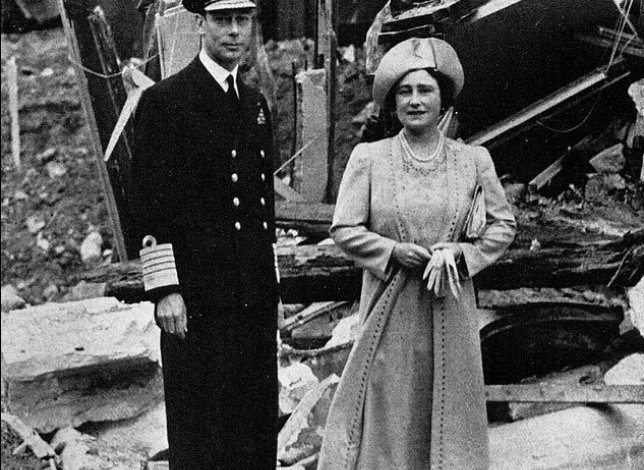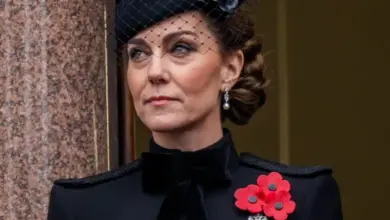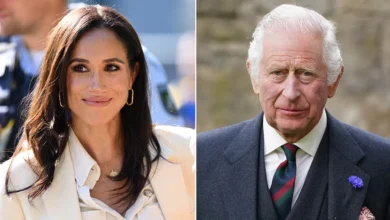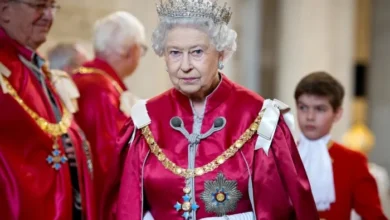King George VI and the Queen Mother narrowly escaped death in the bombing of Buckingham Palace during the Blitz

King George VI and the Queen Mother narrowly escaped death in the bombing of Buckingham Palace during the Blitz – but the man who supplied ‘inside information’ to the Nazis was a royal himself
On September 13, 1940, a German pilot was given his orders: destroy Buckingham Palace and kill the King and Queen. Should he succeed, it would be a military triumph for Adolf Hitler.
Later that day, flying his Heinkel He111 low over The Mall, the Nazi airman dropped the cylindrical explosive bombs known as SC50s on to the symbol of Britain…
King George VI was sitting in a small room overlooking a quadrangle with his wife Queen Elizabeth, the Queen Mother, when he was notified that an attack was imminent and they should head to the air raid shelter.
In no particular rush, the monarch stopped to ask his wife to help him remove an eyelash that was stuck in his eye, when the bomb landed ’30 yards away’ from them, sending ‘a great column of smoke and earth’ into the air.
‘We all ducked like lightning into the corridor,’ the Queen Mother later wrote in a letter to her mother-in-law Queen Mary of Teck. ‘There was another tremendous explosion, and we and our two pages who were outside the door, remained for a moment or two in the corridor away from the staircase, in case of flying glass.’
The royal pair were lucky to have survived, as Winston Churchill penned: ‘Had the windows been closed instead of open, the whole of the glass would have splintered into the faces of the King and Queen, causing terrible injuries.’
Luckily, their daughters – 14-year-old Princess Elizabeth and ten-year-old Princess Margaret – remained safe at Windsor Castle during the air raid.
Six bombs landed on Buckingham Palace that day, making it the most successful direct bombing raid the Germans ever made on the royals – and it swiftly became clear that the Nazis had ‘inside information’.

King George VI and Queen Elizabeth, the Queen Mother, stand among the rubble at Buckingham Palace

Known Nazi sympathiser the Duke of Windsor, formerly King Edward VIII, standing alongside his wife Wallis Simpson and Adolf Hitler
‘Whoever planned the assault had been assisted by a traitor who wished for the deaths of the Royal Family and all those around them,’ historian Alexander Larman wrote in his book The Windsors At War.
And King George VI suspected his own brother Edward.
At the time, Edward was in exile in Europe, having abdicated the throne in December 1936 to marry the American divorcée Wallis Simpson. Now the Duke of Windsor, he became estranged from the Royal Family and was a known Nazi sympathiser.
During a visit to Germany in 1937, he gave Hitler full Nazi salutes, according to biographer Frances Donaldson in her book Edward VIII.
After the ‘wonderful time’ spent with the Führer at his mountain retreat in Bavaria, Edward wrote him a thank you letter. The translated version reads: ‘To the Führer and [Chancellor], the Duchess of Windsor and I would like to thank you sincerely.
‘Our trip through Germany has made a great impression on us. Many thanks to you for the wonderful time that we had with you at the [mountainside retreat] Obersalzberg.’

During his visit to Germany in 1937, Edward (centre) gave Hitler full Nazi salutes

After the ‘wonderful time’ spent with Hitler at his mountain retreat in Bavaria, Edward wrote him a thank you letter
A month before the war broke out, the Duke of Windsor recorded a message to the British public – although the BBC refused to air it. He is reported to have urged Britain to do all it could to ‘come to terms with Nazi Germany’, according to A.N. Wilson, author of Hitler: A Short Biography.
King George had clearly harboured suspicions against his brother for a while. During the so-called ‘Phoney War’ of 1939 – the eight-month period between war being declared and fighting beginning – the King gave Edward, the Duke of Windsor, a military appointment in France with strict instructions that he ‘not be shown secret documents’.
And it would turn out that George’s suspicions were correct.
In the final days of the Second World War, American diplomats uncovered files buried in the forest near Marburg Castle, including around 60 documents that appeared to contain correspondence between the Duke of Windsor and Nazi Germany.
Now known as the Marburg files, or the Windsor Files, the documents contain details of a Nazi-devised plan to gain control of Britain, overthrow the monarchy and reinstate the Duke as King.
It is clearly stated that Edward was seen as a better ally than his brother King George, with the Duke urging the Nazis to bomb Britain ‘to make England ready for peace’.

A young George VI (left) who would later ascend to the throne in 1936 upon the abdication of his brother Edward VIII (right)

The four sons of King George V. From left to right: George, Duke of Kent; Edward, later King Edward VIII and Duke of Windsor; Albert, later King George VI; and Henry, Duke of Gloucester. There was a fifth brother, Prince John, who died young
In the event of a successful invasion, the alleged plan was for Edward to rule a German-occupied Britain as a puppet monarch for Hitler.
A cable from the German ambassador in Lisbon to Berlin reads: ‘[The Duke of Windsor] is convinced that if he had remained on the throne, war would have been avoided, and he characterizes himself as a firm supporter of a peaceful arrangement with Germany.
‘The Duke definitely believes that continued severe bombing would make England ready for peace.’
Reacting to the cable in the documentary Edward VIII: Britain’s Traitor King, historian Andrew Lownie said: ‘Here is the former king of Great Britain saying that if you bomb Britain, bomb his family, bomb his country – that that’s the best way to bring them to sue for peace.
‘He’s quite prepared to go to those lengths in order to achieve his aims. It’s chilling and sinister. And it’s frankly very shocking
‘He was so disloyal to his brother that he was calling for the bombing of Britain as a way of subjugating them.’
Upon the publication of the documents, Buckingham Palace issued a statement that said: ‘His Royal Highness never wavered in his loyalty to the British cause.
‘The German records are necessarily a much tainted source. The only firm evidence which they provide is of what the Germans were trying to do in the matter, and of how completely they failed to do it.’

King George VI and his wife Queen Elizabeth meet air raid victims in the East End of London

The royal pair walk among the rubble in London’s East End during the Blitz

The Queen Mother wrote in a letter: ‘It does affect me seeing this terrible and senseless destruction – I think that I really mind it more than being bombed myself’
Speaking at the Oxford Literary Festival in 2023, royal expert Alexander Larman said: ‘The Nazis knew what they were doing and that’s because they had inside information [from the duke].
‘I don’t think he wanted to see him [his brother King George VI] dead, but he was in a position where he knew exactly where everyone was in Buckingham Palace.’
The fact of the matter is that on September 13, 1940, six bombs were dropped by the German Air Force as part of a direct hit on Buckingham Palace: two in the quadrangle, two in the forecourt, one in the chapel and one in the garden.
One worker, Alfred Davies, was repairing previous damage to the chapel when he was killed in the strike.
Despite the targeted attack and looming suspicion as to who had helped the Nazis, the King and Queen wasted no time in the aftermaths of their near-death experience, jumping in a car to visit London’s bomb-ravaged East End.
It is estimated that more than 12,000 tons of bombs were dropped on London during the Second World War and that nearly 30,000 civilians were killed by enemy action, according to the Imperial War Museum.
‘I really felt if I was walking in a dead city,’ the Queen Mother wrote to Queen Mary.
‘It does affect me seeing this terrible and senseless destruction – I think that I really mind it more than being bombed myself.’

In a picture released to the press, the Queen Mother is seen standing in the rubble of Buckingham Palace with her stoic husband King George. Her statement simply said: ‘I’m glad we’ve been bombed. It makes me feel I can look the East End in the face’
Later, The King’s Private Secretary Sir Alec Hardringe convinced the Queen Mother to issue a statement to the press, demonstrating their no-nonsense courage in the face of the war.
Alongside a picture of her standing in the rubble of Buckingham Palace with her stoic husband King George, the Queen Mother simply said: ‘I’m glad we’ve been bombed. It makes me feel I can look the East End in the face.’
While Larman’s book The Windsors At War does not explicitly accuse the Duke of Windsor of supplying Hitler with inside information, it heavily implies his involvement with the bombing of Buckingham Palace.
The distinguished author wrote: ‘The king made no mention, to his wife, or anyone else, of his suspicions. He did not need to.
‘As for the war, for so long becalmed, lurched into its next stage, the battle lines were now drawn. Country against country, nation against nation. That is should also pit brother against brother seemed inevitable.’





